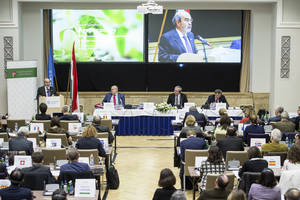
This week in the Hungarian capital, FAO convenes decision makers, experts, civil society organizations and others for three days of discussions on the concept of “agroecology.”
Nearly 200 participants from over 40 countries across Europe and Central Asia will examine current practices in agriculture and food systems, identify opportunities for innovation, and consider how agroecology can be scaled up to help countries achieve the new Sustainable Development Goals.
Agroecological farming considers interactions between natural and human systems so that farmers can derive the full benefits that ecosystems have to offer for sustainable food production -- for example through nutrient cycling, natural regulation of pests, soil and water conservation, and carbon sequestration.
The aim is to develop food systems that are more sustainable and resilient, and that reduce or eliminate the need for external inputs, such as herbicides, pesticides and fertilizers. Agroecology also aims to stabilize yields, supporting family farmers in particular, and strengthening the economic viability of rural areas.
Read the full story on the FAO website here.
